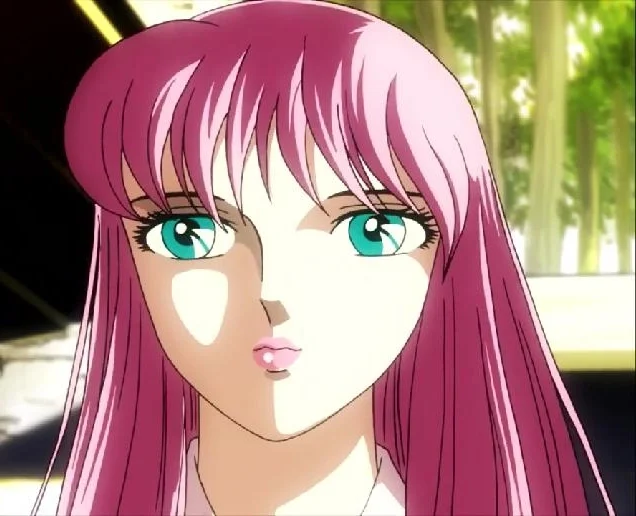Saint Seiya introduces a rich tapestry of powerful and divine characters who embody the strength and essence of gods from various mythologies.
From the mighty Greek Olympians to formidable deities from other cultures, the series offers a diverse array of god-like entities, each contributing to the epic battles and cosmic struggles that define the Saint Seiya universe.
In this comprehensive list, we delve into the god characters in Saint Seiya, exploring their backgrounds, abilities, and roles in shaping the destiny of the cosmos.
Athena
Athena, known as Saori Kido, is the main deity in Saint Seiya and central character in the Saint Seiya franchise. As the goddess of wisdom, love, and war, she plays a pivotal role in the protection of humanity and Earth.
Tasked by her father Zeus, she is reincarnated every 200 years, embodying a mortal form to lead and guide her devoted saints. Despite her divine status, Athena actively engages in battles, demonstrating a strategic and calculated approach.
Her commitment to the well-being of her saints is evident in her presence during critical moments, showcasing both a maternal and warrior-like persona. Click here to know more about Athena’s love interests.
Throughout the series, Athena encounters various challenges, including conflicts with formidable adversaries like Poseidon and Hades.
The character’s complexity extends to controversies surrounding her dual nature as both a goddess and a mortal, explored through her reincarnations as Saori Kido and Sasha.
Atena’s iconic symbol is her sacred armor, and she is depicted with long, dark hair and green or lilac eyes. Her periodic reincarnations and enduring relationships with her saints, particularly those of Pegasus, further contribute to her rich narrative in the Saint Seiya saga.
Odin
Odin is the supreme god of Asgard in Saint Seiya, known as the God of Asgard. He reincarnated in the form of Lifya. In Norse mythology, Odin is considered the primary deity. He also appears in the second Saint Seiya movie.
His role, like many Norse gods, is intricate; he is the god of wisdom, war, and death, and to a lesser extent, magic, poetry, prophecy, victory, and hunting.
In the context of Saint Seiya, Odin has never been seen in his human form, and his earthly representative is a priestess named Hilda. The series doesn’t explicitly mention Odin’s true powers, but drawing from his mythological origins, he could be one of the Great Gods.
Born in the infinite abyss of Ginnungagap before the universe’s existence, Odin, along with Vili and Vé, shaped the entire creation from the “cosmic matter,” which was the blood and flesh of Ymir. Click here to know everything about the Asgard saga in Saint Seiya.
This would make them deities capable of manipulating almost any aspect of the universe (Dunamis). Additionally, Odin is said to have gained infinite magical power after impaling himself on one of the branches of Yggdrasil for nine days and nine nights.
Poseidon
Poseidon, the god of the oceans and one of the Twelve Olympian Gods, was sealed by Athena during the Mythological Era in the First Holy War. Several centuries later, his trident’s seal was removed by Kanon, who was imprisoned at Cape Sounion thirteen years prior.
Upon awakening in an imperfect form, Poseidon takes Julian, a three-year-old, as his Yorishiro. Thirteen years later, manipulated by Kanon due to his incomplete awakening, Poseidon initiates a crusade against Athena.
His revival is intricately linked to the removal of the trident’s seal, the possession of Julian’s body as a vessel, and the influence of Kanon, setting the stage for a tumultuous conflict against Athena and her saints.
Hades
Hades is the God who reigns over the Underworld. Displeased with all the harm caused by humanity, he plans to purify the earthly realm. Since the Age of the Gods, his spirit has incarnated into the physical bodies of humans in an attempt to invade the Earth, yet all these endeavors have been thwarted by Athena.
He was imprisoned during the previous Holy War by Athena’s predecessor but has returned in the present day. His current objective is to exterminate all living beings on Earth through the Great Eclipse. Check who killed Hades in Saint Seiya in this article.
Hypnos and Thanatos
In the Saint Seiya series, Hypnos and Thanatos are divine characters who serve Hades, the primary antagonist and god of the Underworld. They are central figures in the “Hades Saga,” a significant arc within the overall narrative. As brothers, Hypnos and Thanatos are associated with sleep and death, respectively, reflecting their mythological roles.
Hypnos is the Greek god of sleep, and in the context of Saint Seiya, he possesses the ability to induce profound and eternal sleep. This power is often used strategically to incapacitate opponents or create advantageous situations for Hades.
Thanatos, on the other hand, is the Greek god of death. In Saint Seiya, he is responsible for guiding the souls of the deceased to the Underworld. Thanatos is a formidable warrior and has the ability to manipulate the concept of death itself, making him a formidable adversary.
Artemis
In “Next Dimension,” Atena and Artemis engage in a battle at the Temple of the Moon. Atena, accompanied by Shun, faces Satellites’ attacks before encountering Calisto, who reveals that Artemis is displeased with Atena for not only defeating Poseidon and Hades but also attempting to deform time and space.
The intense battle between Atena and Artemis unfolds, with the latter admitting that only the god Cronos possesses the ability to time travel. Despite Artemis urging Atena to leave, she instructs Hecate to guide Saori and Shun to Cronos.
In Heaven Chapter – Overture, a film intended as the canonical continuation but later canceled in favor of “Next Dimension,” Artemis is portrayed as Atena’s older sister and Apollo’s twin.
The elegant goddess arrives on Earth, aiming to request Atena to relinquish the throne while eliminating humans who dared oppose the gods. Atena agrees, provided Artemis forgives the souls of her saints.
The Sanctuary of Atena transforms into the “Sanctuary of Artemis,” signifying a shift in power. Artemis, disdainful of humanity, confronts Atena again, but the confrontation is interrupted by Apollo’s arrival, who takes charge of the situation.
Apolo
In the “Episode G,” Apollo bestows his blessing upon the Trojan hero Hector, granting him invulnerability. Despite this blessing, he is defeated by the Achaean hero Achilles, protected by the goddess Athena. Apollo is also associated with the legend of the Hyacinth flower, symbolizing “love that conquers sorrow.”
In the film “Prologue of Heaven,” Apollo makes a brief appearance towards the end. As Seiya attacks Artemis, Apollo intervenes with a dominant presence, enveloping the surroundings in a dark orange glow. He lifts Saori, praising her beauty but lamenting its impending disappearance.
Seiya questions the gods’ intentions, highlighting Saori’s love for Earth. Apollo asserts humanity’s lack of right to know or speak, declaring their destruction. Seiya attempts to contain Apollo’s attack, but the god intensifies it, leading to the annihilation of reality.
In the final scene, Seiya and Saori appear to have forgotten each other, suggesting Apollo, after Seiya’s efforts, chose to spare humanity but imposed a punishment of forgetfulness. The post-credits scene depicts Seiya with a new armor, facing Apollo once again.
Zeus
Zeus, one of the powerful gods in Greek mythology, is known to be a son of the Titans Cronos and Reia, along with his brothers Hades and Poseidon.
The three brothers divided control over the planet, with Zeus reigning over the heavens, Poseidon over the seas, and Hades over the underworld.
Zeus later engaged in a romance with a mortal woman, resulting in the birth of the demigod Perseus. During the Gigantomachy, a war against the giants led by Typhon, Zeus played a crucial role in defeating and sealing the giant with the help of Athena.
For reasons unknown, Zeus eventually lost interest in humanity and the Earth. He relinquished his dominion over mortals to his trusted daughter Athena, warning other gods about the transient nature of life. Zeus then ascended to the highest heavens, disappearing from the sight of both gods and humans.
In the 20th century, during the Battle of the Twelve Houses, Saga of Gemini revealed his plot to steal Athena’s staff to overthrow Zeus, Poseidon, and Hades, aiming to rule the world.
Ares (Saturn)
Saturn, also known as Ares, emerges as a significant adversary in the Saint Seiya franchise, taking on the role of the ultimate antagonist in Saint Seiya Omega (read a full review about this anime here).
Initially introduced as the secondary protagonist in the second arc, Saturn later unveils his true nature as the overarching antagonist. Koga and the other protagonists find themselves confronting him as the ultimate foe they must overcome.
Portrayed as the God of Time, Saturn is possibly one of the ancient deities in the Saint Seiya universe. Additionally, Saturn possesses his own sword, the Eigouring, which grants him control over all aspects of time.
Eris
Eris is portrayed as the Greek Goddess of Discord in Saintia Sho, serving as the main antagonist in the first Saint Seiya movie, “Saint Seiya: Evil Goddess Eris” (1987).
She is depicted as the mother of dryads and other malicious deities in Greek mythology. Eris takes pleasure in causing suffering to humanity through her seeds of discord, which corrupt the hearts of individuals. Her actions have been linked to various conflicts and wars.
Chronos (+Titans)
Cronus, the King of the Titans, ruled during the Golden Age, generating the oldest Olympian Gods with Rhea. Fearing his own overthrow, his tyranny led to the Titanomachy, where he was defeated by his son Zeus.
Condemned to Tartarus, he and his siblings were released in the 20th century by Pontos, only to be manipulated into facing Athena’s Gold Saints. Cronus eventually surrendered his power to Hades to save his antagonist, completing his tragic tale. Check a complete list for the Titans in Saint Seiya here.
Lucifer
In the fourth Saint Seiya movie, there is an antagonist named Lucifer who draws inspiration from Christian theology. In the movie, Lucifer is portrayed as a powerful and malevolent being associated with darkness and rebellion. He seeks to plunge the world into chaos and confronts the Bronze Saints, the protagonists of the series.

